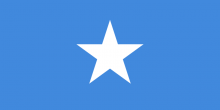The Somali government should immediately release freelance journalist Abdiaziz Abdinur Ibrahim, the East and Horn of Africa Human Rights Defenders Project (EHAHRDP) said today. Mr Abdiaziz Abdinur and 27-year-old woman who claimed she was raped by Somali soldiers in an IDP camp in Mogadishu were convicted on Tuesday 5th February 2013 of offending the honour of a state institution and filing a false report.
On 10th January 2013, police summoned Mr Abdiaziz Abdinur for questioning in connection with his interview with the woman. Both were sentenced at Bernadir Regional Court on 5th February 2013 to one year in prison on politically motivated charges of offending the honour of a state institution and filing a false report. EHAHRDP calls on the Somali government to ensure due process is followed in their appeal, which will demonstrate the level of its commitment to the rights of journalists and women at this pivotal moment in the country’s history.
This case also highlights the need to reform Somalia’s Penal Code, decriminalising vague offences such as defamation and false news which are open to political manipulation.
“This ruling is a slap in the face to the Somali government which aspires to be recognised as a government that adheres to the rule of law, but which at the same time undermines freedom of expression for the media and neglects vulnerable groups,” said Hassan Shire Sheikh, Executive Director of EHAHRDP. “You cannot practice rule of law and not promote the human rights of your citizens.”
A trial observation team trained by EHAHRDP noted that the pair’s detention and trial was beset with serious flaws and violations. Upon his arrest Mr Abdiaziz Abdinur was illegally detained without charge for 19 days, with limited access to a lawyer. Throughout this detention, top Somali officials, including the police chief, and the interior minister, issued statements that prematurely judged his guilt and undermined the credibility of the judicial process. The woman was interrogated over 48 hours with no access to legal counsel. She was released upon retracting her story in a press conference, and admitting to being paid by Mr. Abdiaziz Abdinur in his effort to discredit the government.
The prosecution case centred on the evidence of a doctor who claimed there had not been any rape, but at no point appeared to testify. A degrading and medically discredited finger test was used for the diagnosis. Meanwhile the lawyer for the defence, Mohamed Mohamud Afrah, saw his request that the court hear four eye-witnesses who were present when the incident took place rejected by the court.
Somalia has regained a level of stability since African Union forces pushed back al-Shabaab militants from their stronghold in the capital in August 2012. However, this case highlights the fact that human rights defenders are undertaking a huge risk in claiming basic rights such as freedom of expression, or raising awareness of gender-based violence. Following the end of the transition, the new Government of Somalia has repeatedly stated its commitment to rule of law, but great challenges remain.
The Committee to Protect Journalists (CPJ) documented 12 murders of media workers in Somalia last year, making it the most dangerous country in Africa for journalists. On 18th January 2013, Radio Shabelle journalist Abdihared Osman was shot dead in Mogadishu by unidentified assailants. EHAHRDP has repeatedly condemned attacks on media workers in Somalia and called for perpetrators to be brought to justice in fair trials following full, timely and impartial investigations.
“Journalists have a vital role to play in building a democratic and rights-respecting state,” said Mr Shire Sheikh. “They should be free to report on issues of public interest without fear of reprisals.”
To read more of EHAHRDP’s statements on Somalia, please see:
“Somalia: End Impunity for Killing of Media Workers,” 1st November 2012: http://www.defenddefenders.
Oral Intervention on Somalia at the UN Human Rights Council, 26th September 2012: http://www.defenddefenders.
For more information, please contact:
Mr Hassan Shire Sheikh, Executive Director on +256 772 753 753, [email protected] or [email protected];
Ms Rachel Nicholson, Advocacy Officer on +256 312 265 824, +256 778 921 274 or advocacy@defenddefenders.

